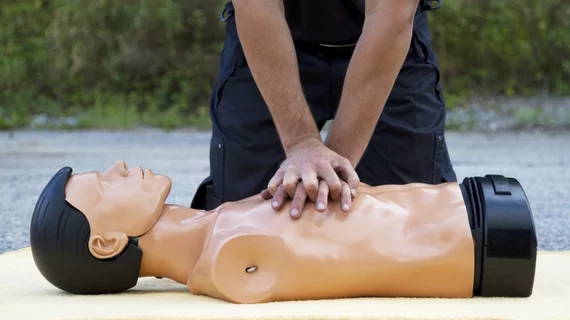Philips, AHA partner to optimize survival for victims of sudden cardiac arrest
Royal Philips and the American Heart Association are collaborating for a new program devoted to increasing survival rates in patients who experience sudden cardiac arrest (SCA), the organizations announced Jan. 23.
The Connected Pulse program, which is geared toward both professional and lay responders, combines a series of educational programs and technologies to optimize the process of responding to SCA, from the first call to emergency medical services through delivering treatment with an automated external defibrillator (AED) and administering advanced critical life support.
“When we educate everyone about the life-saving skill of CPR and make AEDs readily available, we increase the chance of survival for all people,” Nancy Brown, CEO of the AHA, said in a press release. “Together with Philips, we’ve combined trusted science and innovative health technology to create a positive health impact in all communities around the world.”
An estimated 70 to 80 percent of SCAs occur outside of a hospital, according to the AHA, and a victim’s chance of survival decreases 10 percent with every minute they don’t receive CPR or defibrillation. Bystander intervention and treatment with an AED can triple the survival rate, but only half of Americans know CPR.
Connected Pulse looks to correct that figure with more AHA training centers, public education training campaigns, a CPR training kit for schools and nationwide touch-screen training kiosks that offer brief lessons and a 30-second CPR test. Increased training will be extended to health professionals, too, with updated EMS training and in-hospital Resuscitation Quality Improvement programs.
Other tech-driven components of the program include a GPS positioning service, which identifies the nearest available AED and the closest CPR-certified person in the case of an SCA. New software will enable smoother data transmission across systems, and dispatch operators will be taught how to give easy hands-only CPR training to bystanders over the phone.
According to the release, Philips and the AHA hope Connected Pulse will particularly help boost SCA survival rates in densely populated areas.
“By joining with the American Heart Association to offer a large-scale, integrated suite of services and expertise, we have the opportunity to make a significant positive impact on the chances of survival from sudden cardiac arrests that occur outside of the hospital, especially in major cities with huge populations,” Philips CEO Frans van Houten said.

